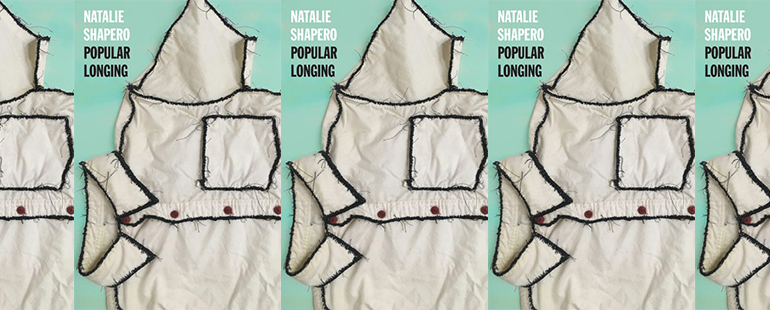Popular Longing by Natalie Shapero

Popular Longing
Natalie Shapero
Copper Canyon Press | Feb 16, 2021
Natalie Shapero is a linguistic sharpshooter with merciless accuracy. Her third collection, Popular Longing, connects the inconsistencies, contradictions, and sheer absurdity of humanity with repeated bullseyes.
Indeed, the poems in the collection skewer modern mores and target the human condition with memorable flair and tremendous craft, and Shapero’s economic language reflects a multiplicity of thought. Take, for example, her pithy observations about modern society in “Other Things, If Not More Urgent Things”:
“How the largest possible quantity
of anything is a lifetime. A lifetime
of oat bran. A lifetime of timing belts.
A lifetime of saying SURE, WHY NOT,
I’M ONLY ON EARTH X NUMBER
OF YEARS,
and not knowing what
to make X.”
Here as in many of these poems, by pruning excuses and obfuscating language, Shapero subtly encourages readers to consider what a life is, and the futility—and absurdity—of attempting to value it in objects or conventional success. The sharper her constructs, the more evident our failings, yet this ability to self-denigrate is surely better than the alternative—the national trend toward self-idolatry. We see this in “Magpie”: “The name is meant to conjure up a gorgeous, inky / creature culling treasures to bring / back, but if you really get close / to a magpie’s nest, you see it’s all trash.” How reminiscent of our multitudinous social media presences: perfectly lit images and angles hiding the mess behind.
Shapero is an incisive social critic, cutting through the smog of self-absorption and contradictions between what is said and done. In her work, hope and futility waltz together, amid underlying essential truths about our lives, which are tragic, conflicted, farcical, and a one-time-only, singular experience. She writes: “This wish to feel young—recalling / my own past, I can’t imagine desiring to go backward, / but of course I am aware it’s a popular longing.” It’s a longing with little hope of easing our current paths, as we cannot change the past, and have even less control over the future. Indeed, Shapero’s interest is in all of our popular longings, and in her thoughtful and inventive manner, she questions the likelihood of attaining our dreams, as well as whether or not these dreams serve us in the first place. In reading “Ohio on TV,” the speaker remarks on our fruitless focus on the past, and the improbability of altering our present or our future:
“I’m desperate to travel in time
to before we all started treating each other
so poorly, but I know I would be like the character
whose power is she can wind back the clock,
but only for three minutes.
It’s not long enough to prevent anything.It’s only enough time to tear through the downtown
bawling and then watch it all happen again.”
In addition to trenchant commentary on these uncivil times, Shapero is also suggesting a response to George Santayana’s aphorism that “Those who cannot remember the past are condemned to repeat it,” expanding its meaning and impact for the modern age. It speaks to our chronic—if not compulsive—rewinding of images in unending loops on large and small screens, perhaps offering an updated aphorism for our technologically addicted times: those who cannot release the past are doomed to misplace the present.
Shapero’s lens is equally powerful whether it involves minute investigations of our quotidian harms, as it is about the unprecedented—and purposeless—havoc we cause on each other. In “California,” she considers memory, perspective, and existentialism, for the individual and the universe, beginning with a visceral shock of violence: “For years I would wonder whether / the man who attacked me— / in his memory, did the event of it / persist as a dull sort of flash? Then / he died and became himself / just a flash in the mind of the world. / Now I wonder—is he anywhere?”
This poem tackles a supremely challenging concept by considering the attacker’s perspective and placing it in parallel to the one who has been harmed. There are no easy or longstanding resolutions here. Though the shock of the physical attack starts this section, Shapero immediately swerves to “Is he anywhere?”—which reflects on the duration of our existence in the universal consciousness—a rhetorical question that encompasses our longings and expectations for respite, in this world. Here, as in the entire collection, Shapero reveals a sensitivity for the joy and pain we feel simply from being alive.
In Endgame, Samuel Beckett wrote “you’re on earth, there’s no cure for that!” There may be no cure, but Natalie Shapero’s dark, delightful, and insightful collection is both a clear-eyed reflection of and an antidote for our times.


